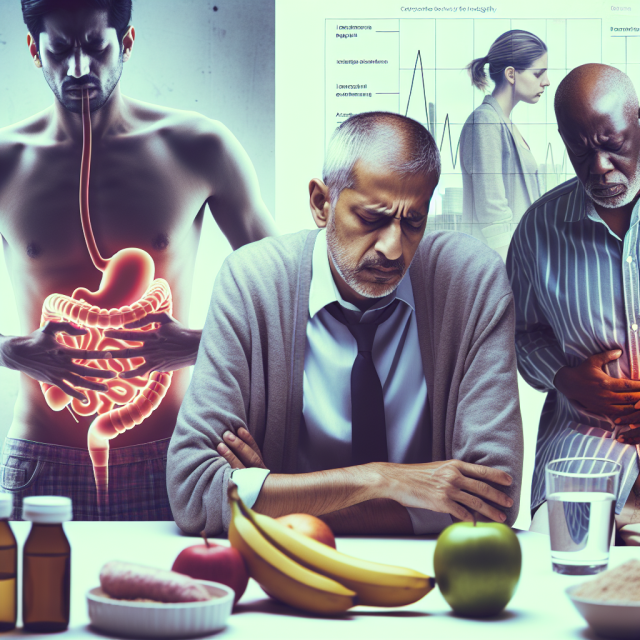
Introduction:
Crohn’s disease isn’t just a stomach issue—it’s a life-changing condition that affects millions worldwide. It can be unpredictable, flaring up suddenly and disrupting your day. Recognizing Crohn’s disease symptoms early is crucial for managing the condition and preventing complications. Whether you’re experiencing these symptoms yourself or supporting a loved one, understanding what to look for can make all the difference. In this article, we’ll break down common symptoms, early warning signs, and when it’s time to get professional help.
Table of Contents:
What is Crohn’s Disease?
Crohn’s disease is a chronic inflammatory condition that primarily affects the digestive tract, often targeting the small intestine and colon. It is one of the main types of inflammatory bowel disease (IBD). The exact cause is unknown, but it’s believed to involve an abnormal immune response, genetics, and environmental triggers.
Living with Crohn’s is like having an unpredictable guest who arrives without warning and stays far too long. You never know when symptoms will flare up, making daily life challenging.
Learn more about Crohn’s disease at HealingWell Health
Common Crohn’s Disease Symptoms
Crohn’s disease affects everyone differently, but some symptoms are more common than others. Here’s what to watch for:
- Abdominal Pain and Cramping: Often in the lower right side, this pain results from inflammation in the intestines.
- Chronic Diarrhea: Frequent, urgent bowel movements are a hallmark symptom.
- Fatigue: The body’s constant fight against inflammation can leave you feeling drained.
- Unintended Weight Loss: Difficulty absorbing nutrients often leads to weight loss.
- Loss of Appetite: Constant discomfort can make eating unappealing.
- Fever: Inflammation and infection may cause recurring fevers.
- Blood in Stool: Ulcers in the intestine can cause bleeding, which may appear in your stool.
Have you ever felt like your body was working against you? That’s how many people with Crohn’s describe their symptoms—relentless and exhausting.
Early Warning Signs Not to Ignore
Catching Crohn’s disease early can prevent severe complications. Here are some subtle signs to watch for:
- Mouth Sores: Painful ulcers in the mouth can be an early clue.
- Joint Pain: Inflammation can extend beyond the gut, affecting your joints.
- Eye Redness or Pain: Crohn’s can cause eye inflammation (uveitis).
- Skin Rashes: Painful bumps or ulcers on the skin may signal a flare-up.
- Night Sweats: Frequent night sweats can accompany inflammation.
Think of these warning signs as your body’s “check engine” light. Ignoring them could lead to more serious issues down the road.
Complications from Crohn’s Disease Symptoms
Without proper management, Crohn’s disease can lead to severe complications:
- Intestinal Strictures: Narrowing of the intestines from chronic inflammation can cause blockages.
- Fistulas: Abnormal connections between different body parts, such as between the intestine and bladder.
- Abscesses: Painful, pus-filled infections inside the abdomen.
- Malnutrition: Inflammation can prevent your body from absorbing nutrients.
- Colon Cancer: Long-term inflammation increases the risk of colorectal cancer.
Managing symptoms early can help prevent these life-threatening complications.
When to Seek Medical Help
It’s easy to dismiss stomach pain as something minor, but with Crohn’s disease, waiting too long can be dangerous. Contact a healthcare provider if you experience:
- Severe or Persistent Abdominal Pain: Especially if it’s accompanied by fever.
- Unexplained Weight Loss: Rapid weight loss without dieting is a red flag.
- Bloody Stool: Even a small amount of blood requires immediate attention.
- Frequent Vomiting: Persistent vomiting can lead to dehydration and malnutrition.
- High Fever: Especially if it accompanies abdominal pain.
If symptoms escalate suddenly, call 911 or seek emergency care immediately.
Join the HealingWell Crohn’s Disease Community
Managing Crohn’s Disease Symptoms
While there’s no cure for Crohn’s, effective management can reduce symptoms and improve quality of life:
-
Medications:
- Biologics (e.g., Humira, Remicade): Target specific proteins that cause inflammation.
- Immunosuppressants (e.g., Azathioprine): Reduce the immune system’s attack on the intestines.
- Corticosteroids (e.g., Prednisone): Help control flare-ups quickly.
-
Diet and Nutrition:
- Eat small, frequent meals to reduce strain on the digestive system.
- Avoid trigger foods like spicy dishes, dairy, and high-fiber vegetables.
- Stay hydrated—especially during flare-ups.
-
Lifestyle Changes:
- Manage stress with techniques like yoga or meditation.
- Quit smoking—tobacco worsens Crohn’s symptoms.
- Get regular exercise to boost overall well-being.
-
Regular Screenings:
- Colonoscopies can detect complications like strictures or early signs of cancer.
Explore more management tips at HealingWell Health
Conclusion:
Crohn’s disease is a lifelong condition, but recognizing Crohn’s disease symptoms early and managing them effectively can prevent complications and improve your quality of life. Whether you’re newly diagnosed or have lived with Crohn’s for years, staying informed and proactive is key. Listen to your body, and never hesitate to reach out for support. Remember, you’re not alone on this journey.
FAQs on Crohn’s Disease Symptoms:
1. What are the first symptoms of Crohn’s disease?
The first symptoms often include persistent diarrhea, abdominal pain, fatigue, and weight loss.
2. Can Crohn’s disease cause joint pain?
Yes, Crohn’s can cause inflammation in the joints, leading to pain and stiffness, a condition known as enteropathic arthritis.
3. Is there a cure for Crohn’s disease symptoms?
There is no cure, but medications like Humira and Remicade can help control symptoms and reduce flare-ups.
4. Can Crohn’s disease symptoms appear suddenly?
Yes, Crohn’s symptoms can develop gradually or suddenly, often during a flare-up.
5. Should I see a doctor for mild Crohn’s disease symptoms?
Yes. Early diagnosis and treatment can prevent complications, so it’s essential to consult a healthcare professional if you experience ongoing symptoms.
This content is not medical advice. For any health issues, always consult a healthcare professional. In an emergency, call 911 or your local emergency services.




